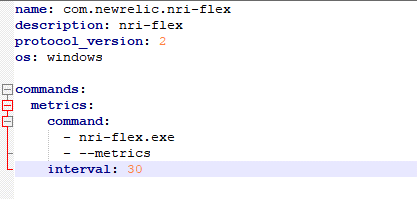Flex is an application-agnostic, all-in-one New Relic integration with which you can instrument any app that exposes metrics over a standard protocol (HTTP, file, shell) in a standard format (for example, JSON or plain text): you create a config file, start the Infrastructure agent, and data starts pouring into New Relic.
Flex can take any input using data source APIs, process it through functions, and send metric samples to New Relic as if they came from an integration.
For a quick introduction on Flex, read our blog post. You can also have a look at the 200+ example integrations!
Flex requires a New Relic account and is compatible with the following operating systems/platforms:
- Linux
- Windows
- Kubernetes
For more information on compatible distros and versions, see the Infrastructure agent compatibility page.
Flex comes bundled with the New Relic infrastructure agent. To install the infrastructure agent, see Install the infrastructure agent.
If you're using Kubernetes, see Configure Flex in Kubernetes.
The Flex step-by-step tutorial is a great starting point.
All examples are located in /examples.
Note that some examples may use features that are experimental (not officially supported) or deprecated.
- Flex usage documentation
- How to configure Flex
- Flex under Kubernetes
- Data sources / APIS
- Data transformation functions
- Experimental functions
While developing your own Flex integrations, you can use Flex without the New Relic Infrastructure agent for debugging. For more information, see Development.
Should you need assistance with New Relic products, you are in good hands with several support diagnostic tools and support channels.
If the issue has been confirmed as a bug or is a feature request, file a GitHub issue.
Support Channels
- Use the Flex manager in New Relic One to visualize Flex data and manage the Flex integration.
- New Relic Community: The best place to engage in troubleshooting questions
- New Relic Developer: Resources for building a custom observability applications
- New Relic Technical Support 24/7/365 ticketed support. Read more about our Technical Support Offerings.
At New Relic we take your privacy and the security of your information seriously, and are committed to protecting your information. We must emphasize the importance of not sharing personal data in public forums, and ask all users to scrub logs and diagnostic information for sensitive information, whether personal, proprietary, or otherwise.
We define “Personal Data” as any information relating to an identified or identifiable individual, including, for example, your name, phone number, post code or zip code, Device ID, IP address, and email address.
For more information, review New Relic’s General Data Privacy Notice.
We encourage your contributions to improve this project! Keep in mind that when you submit your pull request, you'll need to sign the CLA via the click-through using CLA-Assistant. You only have to sign the CLA one time per project.
If you have any questions, or to execute our corporate CLA (which is required if your contribution is on behalf of a company), drop us an email at [email protected].
A note about vulnerabilities
As noted in our security policy, New Relic is committed to the privacy and security of our customers and their data. We believe that providing coordinated disclosure by security researchers and engaging with the security community are important means to achieve our security goals.
If you believe you have found a security vulnerability in this project or any of New Relic's products or websites, we welcome and greatly appreciate you reporting it to New Relic through HackerOne.
If you would like to contribute to this project, review these guidelines.
To all contributors, we thank you! Without your contribution, this project would not be what it is today.
nri-flex is licensed under the Apache 2.0 License.













